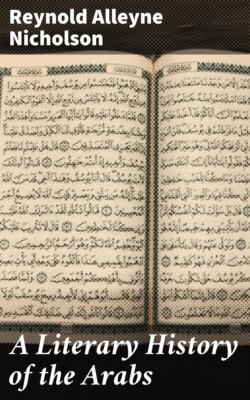Читать книгу A Literary History of the Arabs - Reynold Alleyne Nicholson - Страница 3
На сайте Литреса книга снята с продажи.
PREFACE
ОглавлениеTable of Contents
A Literary History of the Arabs, published by T. Fisher Unwin in 1907 and twice re-issued without alteration, now appears under new auspices, and I wish to thank the Syndics of the Cambridge University Press for the opportunity they have given me of making it in some respects more accurate and useful than it has hitherto been. Since the present edition is printed from the original plates, there could be no question of revising the book throughout and recasting it where necessary; but while only a few pages have been rewritten, the Bibliography has been brought up to date and I have removed several mistakes from the text and corrected others in an appendix which includes a certain amount of supplementary matter. As stated in the preface to the first edition, I hoped "to compile a work which should serve as a general introduction to the subject, and which should be neither too popular for students nor too scientific for ordinary readers. It has been my chief aim to sketch in broad outlines what the Arabs thought, and to indicate as far as possible the influences which moulded their thought. … Experience has convinced me that young students of Arabic, to whom this volume is principally addressed, often find difficulty in understanding what they read, since they are not in touch with the political, intellectual, and religious notions which are presented to them. The pages of almost every Arabic book abound in allusions to names, events, movements, and ideas of which Moslems require no explanation, but which puzzle the Western reader unless he have some general knowledge of Arabian history in the widest meaning of the word. Such a survey is not to be found, I believe, in any single European book; and if mine supply the want, however partially and inadequately, I shall feel that my labour has been amply rewarded. … As regards the choice of topics, I agree with the author of a famous anthology who declares that it is harder to select than compose (ikhtiyáru ’l-kalám aṣ‘abu min ta’lífihi). Perhaps an epitomist may be excused for not doing equal justice all round. To me the literary side of the subject appeals more than the historical, and I have followed my bent without hesitation; for in order to interest others a writer must first be interested himself. … Considering the importance of Arabic poetry as, in the main, a true mirror of Arabian life, I do not think the space devoted to it is excessive. Other branches of literature could not receive the same attention. Many an eminent writer has been dismissed in a few lines, many well-known names have been passed over. But, as before said, this work is a sketch of ideas in their historical environment rather than a record of authors, books, and dates. The exact transliteration of Arabic words, though superfluous for scholars and for persons entirely ignorant of the language, is an almost indispensable aid to the class of readers whom I have especially in view. My system is that recommended by the Royal Asiatic Society and adopted by Professor Browne in his Literary History of Persia; but I use ẓ for the letter which he denotes by dh. The definite article al, which is frequently omitted at the beginning of proper names, has been restored in the Index. It may save trouble if I mention here the abbreviations 'b.' for 'ibn' (son of); J.R.A.S. for Journal of the Royal Asiatic Society; Z.D.M.G. for Zeitschrift der Deutschen Morgenländischen Gesellschaft; and S.B.W.A. for Sitzungsberichte der Wiener Akademie. Finally, it behoves me to make full acknowledgment of my debt to the learned Orientalists whose works I have studied and freely 'conveyed' into these pages. References could not be given in every case, but the reader will see for himself how much is derived from Von Kremer, Goldziher, Nöldeke, and Wellhausen, to mention only a few of the leading authorities. At the same time I have constantly gone back to the native sources of information."
There remains an acknowledgment of a more personal kind. Twenty-two years ago I wrote—"my warmest thanks are due to my friend and colleague, Professor A. A. Bevan, who read the proofs throughout and made a number of valuable remarks which will be found in the footnotes." Happily the present occasion permits me to renew those ties between us; and the book which he helped into the world now celebrates its majority by associating itself with his name.
REYNOLD A. NICHOLSON
November 1, 1929
